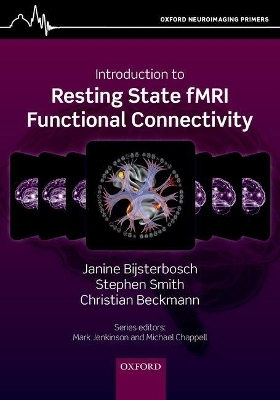
Introduction to Resting State fMRI Functional Connectivity
Oxford University Press (Verlag)
978-0-19-880822-0 (ISBN)
Spontaneous resting-state fluctuations in neuronal activity offer insights into the inherent organization of the human brain, and may provide markers for diagnosis and treatment of mental disorders. Resting state functional magnetic resonance imaging (fMRI) can be used to investigate intrinsic functional connectivity networks, which are identified based on similarities in the signal measured from different brain regions.
From data acquisition to interpretation of results, Introduction to Resting State fMRI Functional Connectivity discusses a wide range of approaches without requiring any previous knowledge of resting state fMRI, making it highly accessible to readers from a broad range of backgrounds.
Supplemented with online datasets and examples to enable the reader to obtain hands-on experience working with real data, this primer provides a practical and approachable introduction for those new to the field of resting state fMRI.
The Oxford Neuroimaging Primers are short texts aimed at new researchers or advanced undergraduates from the biological, medical or physical sciences. They are intended to provide a thorough understanding of the ways in which neuroimaging data can be analyzed and how that relates to acquisition and interpretation. Each primer has been written so that it is a stand-alone introduction to a particular area of neuroimaging, and the primers also work together to provide a comprehensive foundation for this increasingly influential field.
Dr Janine D. Bijsterbosch is currently a postdoctoral researcher in the Analysis Group in the FMRIB Centre, University of Oxford, specialising in resting-state analysis. She has worked in brain imaging since 2007, with a background in psychology and experience working in psychology, psychiatry and neuroscience. Janine has considerable teaching experience, being the course organiser, lecturer and senior tutor on both the FMRIB Graduate Programme and the FSL Course. Professor Stephen M. Smith is a Professor of Biomedical Engineering in the FMRIB Centre, University of Oxford and founded the Analysis Group there in 1997. He is the co-founder of FSL (FMRIB Software Library, www.fmrib.ox.ac.uk/fsl) and has written many tools for analysis of structural, diffusion and functional data, with a recent emphasis on resting-state imaging. In 2007 Stephen received the Wiley Young Investigator Award from the Organisation for Human Brain Mapping. Professor Christian F. Beckmann is a Professor of Statistics in Imaging Neuroscience at the Radboud University Medical Centre Nijmegen and leads the Statistical Imaging Neurosciences group at the Donders Institute for Brain, Cognition and Behaviour in Nijmegen. His research focuses on Independent Component Analysis in fMRI, utilising information theoretic principles for the development of imaging biomarkers, advanced diagnosis systems and understanding of the human brain. Christian has taught on the FSL Course since its inception in 2002 and in 2011 he received the Wiley Young Investigator Award from the Organisation for Human Brain Mapping.
1: Introduction
2: Data Acquisition
3: Data Preprocessing
4: Voxel-based Connectivity Analyses
5: Node-based Connectivity Analyses
6: Interpretation
| Erscheinungsdatum | 02.06.2017 |
|---|---|
| Reihe/Serie | Oxford Neuroimaging Primers |
| Verlagsort | Oxford |
| Sprache | englisch |
| Maße | 168 x 241 mm |
| Gewicht | 304 g |
| Themenwelt | Geisteswissenschaften ► Psychologie ► Biopsychologie / Neurowissenschaften |
| Medizin / Pharmazie ► Medizinische Fachgebiete ► Neurologie | |
| Medizin / Pharmazie ► Medizinische Fachgebiete ► Radiologie / Bildgebende Verfahren | |
| Naturwissenschaften ► Biologie ► Humanbiologie | |
| Naturwissenschaften ► Biologie ► Zoologie | |
| ISBN-10 | 0-19-880822-4 / 0198808224 |
| ISBN-13 | 978-0-19-880822-0 / 9780198808220 |
| Zustand | Neuware |
| Informationen gemäß Produktsicherheitsverordnung (GPSR) | |
| Haben Sie eine Frage zum Produkt? |
aus dem Bereich


